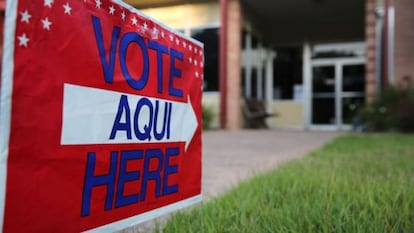In search of the first Latino president
Community in the US needs to define its objectives in the quest for influence, say experts


With a population in excess of 54 million people, Latino-Hispanics have made major political inroads in the United States in recent years, becoming the largest minority community in the country.
From a Supreme Court justice, Sonia Sotomayor, who has sat on the bench since 2009, to three US senators – two of whom are running for the Republican presidential nomination – Latinos are now serving in a wide range of key roles across the nation.
The only post we haven’t conquered yet is the Oval Office” Cristóbal Alex, president of the Latino Victory Project
There are 28 Latino members in the US House of Representatives, while President Obama has appointed several from the community to his Cabinet. More than 6,000 Latinos serve as top-ranking state and federal officials – including mayors and governors – across the nation.
But while their political power is growing – 27 million Latinos could potentially vote in next year’s presidential elections, according to Mark Hugo López of the Pew Hispanic Center – many have questioned what should be their objective in their search to consolidate power.
“The only post we haven’t conquered yet is the Oval Office", says Cristóbal Alex, president of the Latino Victory Project, an organization that helps Latino-Hispanics in local, state and federal races across the United States.
Two Republican senators with Cuban heritage – Marco Rubio of Florida and Ted Cruz of Texas – are already in the race for the White House, and third party contender, former Florida Governor Jeb Bush, is closely linked to the Latino community through his Mexican-born wife.
But for many activists, these aren’t the ideal US presidential candidates.
“I question just how Latino these Republican candidates are,” says Ben Monterroso, director of Mi Familia Vota, a group that promotes civic participation in the community.
“We need to be sure that Latinos are not just elected because of their names or because they come to our communities speaking Spanish and to eat tacos with us,” he says. “But instead because they listen and understand what we have to say and want to do something for our communities,”
Luis Miranda – who was President Obama’s spokesman for Latino affairs during his first term in office and the first to hold that post – goes even further.
We don’t need a Hispanic president just for the sake of having a Hispanic president”
“We don’t need a Hispanic president just for the sake of having a Hispanic president. We need a president who, despite being president, is also a Hispanic,” says Miranda. “Obama isn’t a black president; he is a president who represents all Americans.”
Many believe that the anti-immigration rhetoric from various Republican contenders, including Donald Trump, could see more Latino-Hispanics going to the polls next year. But the key lies as to how many from the community will go out and vote, because not all of those who are eligible actually get to the ballot box on election day.
While experts point to the 2012 elections as a milestone in the number of Latino-Hispanic voters who cast ballots, and despite the minority community’s estimated voting force of 17.1 percent of the total, the Latino-Hispanic vote only constituted 10 percent of the final total.
I am certain that in 2016, we Latinos are going to determine who will be the next person in the White House”
But Miranda is hopeful that more Latino-Hispanics will participate next year.
“What we expected is a better future, always and when there is participation,” he says. “Our potential is there – we see it every year and the proof was in 2012,” where the Latino vote was key to Obama’s re-election.
“I am certain that in 2016, we Latinos are going to determine who will be the next person in the White House,” he concludes.
English version by Martin Delfín.







































